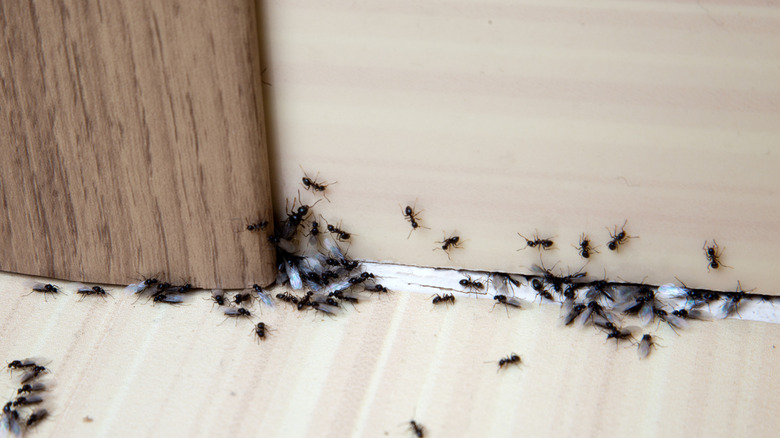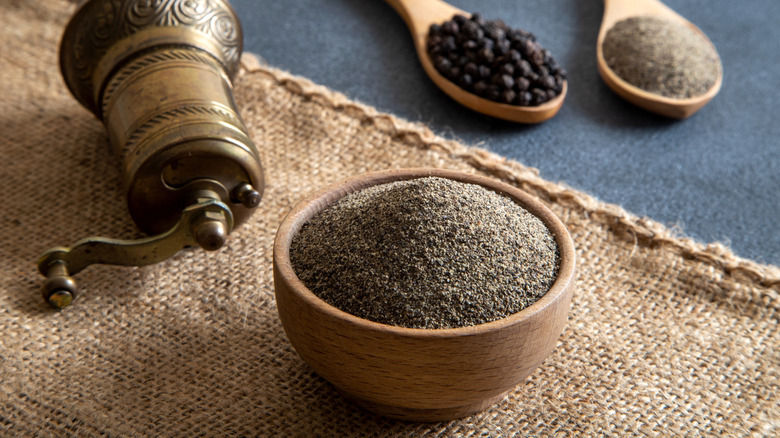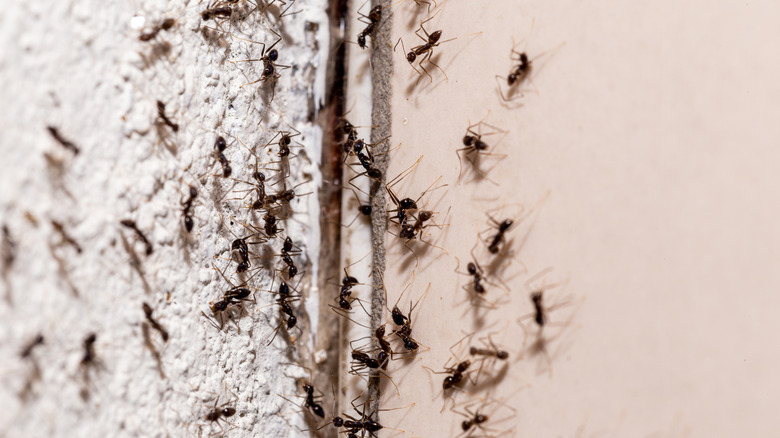The Toxin-Free Way To Keep Ants Out Of Your Home (That Won't Cost A Dime)
Ants are tiny, resourceful creatures that may appear throughout your home. Whether they parade along your kitchen countertops, creep in the foyer, or hang out in the bathtub, they can be a nuisance. Sending them packing doesn't need to involve traditional ant sprays, though. There's a great toxin-free solution to keep ants out already in your kitchen and it doesn't cost a dime: pepper. Many people concerned about the dangers of using pest control sprays around children and pets might look for eco-friendly options instead. Conventional products may contain pesticides, which could trigger respiratory issues, allergic reactions, and skin irritation. Using pepper against ants isn't just a non-toxic approach, it's also budget-friendly. It offers a peace of mind if your pet or curious children come into contact with treated areas, because it's all-natural and food-safe. Plus, unlike other kitchen ingredients that'll make ants a thing of the past, such as vinegar, pepper works without leaving behind an intense smell.
Although they might not seem destructive, ants can cause multiple forms of damage throughout your home. They may chew electrical wires, potentially causing short circuits and fire damage. In some cases, they may also eat insulation, leading to expensive repairs. The insects can also pose a health risk, especially if they get into your food. When ants travel from the bathroom to the kitchen, they carry along potential bacteria and pathogens from one environment to another. The only ant activity you likely want to see in your home is in the form of an animated feature. It's time to skip the chemical sprays in favor of pepper and here's why it drives them away.
Using pepper to keep out ants
There are two ways to deter ants with this spice. First, you can sprinkle ground pepper along the areas where you frequently see ants, such as along the baseboards or window ledge. You can also make a spray by combining 1 part pepper with 10 parts of water, then spraying anywhere with ant activity. This is an effective deterrent because of pepper's strong, powerful scent. Such a spray can even kill ants, as one Texas A&M University study found ants died more readily with a spray of pepper and water than water alone. However, if you have pets, such as cats, avoid putting it in any area where they frequently visit, as the ingredient can irritate their respiratory system and cause stomach upset if ingested.
Pepper features a strong scent that ants often avoid, likely because of their heightened sense of smell. One Vanderbilt University study found ants have around 400 smell receptors, compared to some insects, such as fruit flies, that only have 61. They don't just use their sense of smell to find food. Their finely-tuned olfactory system plays a significant role in their communication and navigation. It allows them to detect pheromones through scent trails left by other members in their colony. When you introduce a heavy scent like pepper in their path, it can overstimulate their olfactory receptors, disrupting their ability to navigate with pheromone chemicals along these trails. The increased sensory input can impede their communication process as well, so they're more likely to avoid the area.
More non-toxic ways to keep ants out of your home
In addition to using pepper as a non-toxic barrier for them, you should eliminate things that make it easier for ants to wander into the home. Carefully wipe down your counters and clean your floors to remove any crumbs or spills, especially of any sugary drinks, such as juice or soda. Get rid of any potential food sources that are rotten, such as fruit, and seal any open containers to avoid ant activity. You should also seal any cracks, especially those near doors or windows, as ants often enter through them. While you're at it, repair or replace any holes in window screens, another common ant entry point. Try to eliminate any sources of moisture, such as a leaking pipe or dripping faucet, which may be the reason you're finding ants in the bathroom.
It's best to be proactive after ant prevention year-round, but pay special attention to when ants are most active. This stretch is namely March through October, though ant activity can still occur outside this period. These months mark a period of increased activity for ants, as just like humans, they can take advantage of the warmer temperatures and longer daylight hours. They will also reproduce during this time, thereby increasing the potential for an ant colony to develop in your home. Cut them off at the pass by making your space less attractive, such as using this pungent deterrent and closing up potential entrances.


